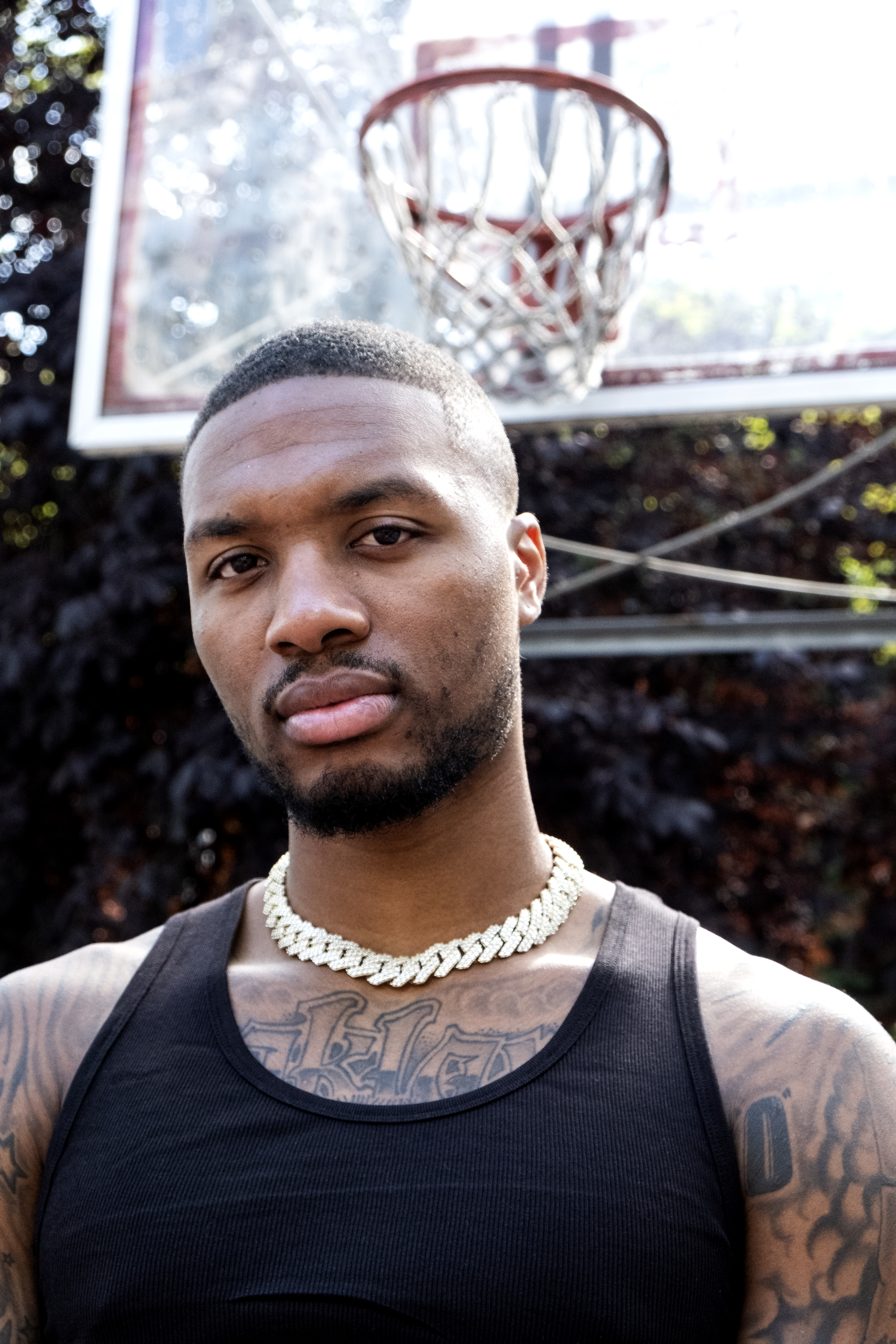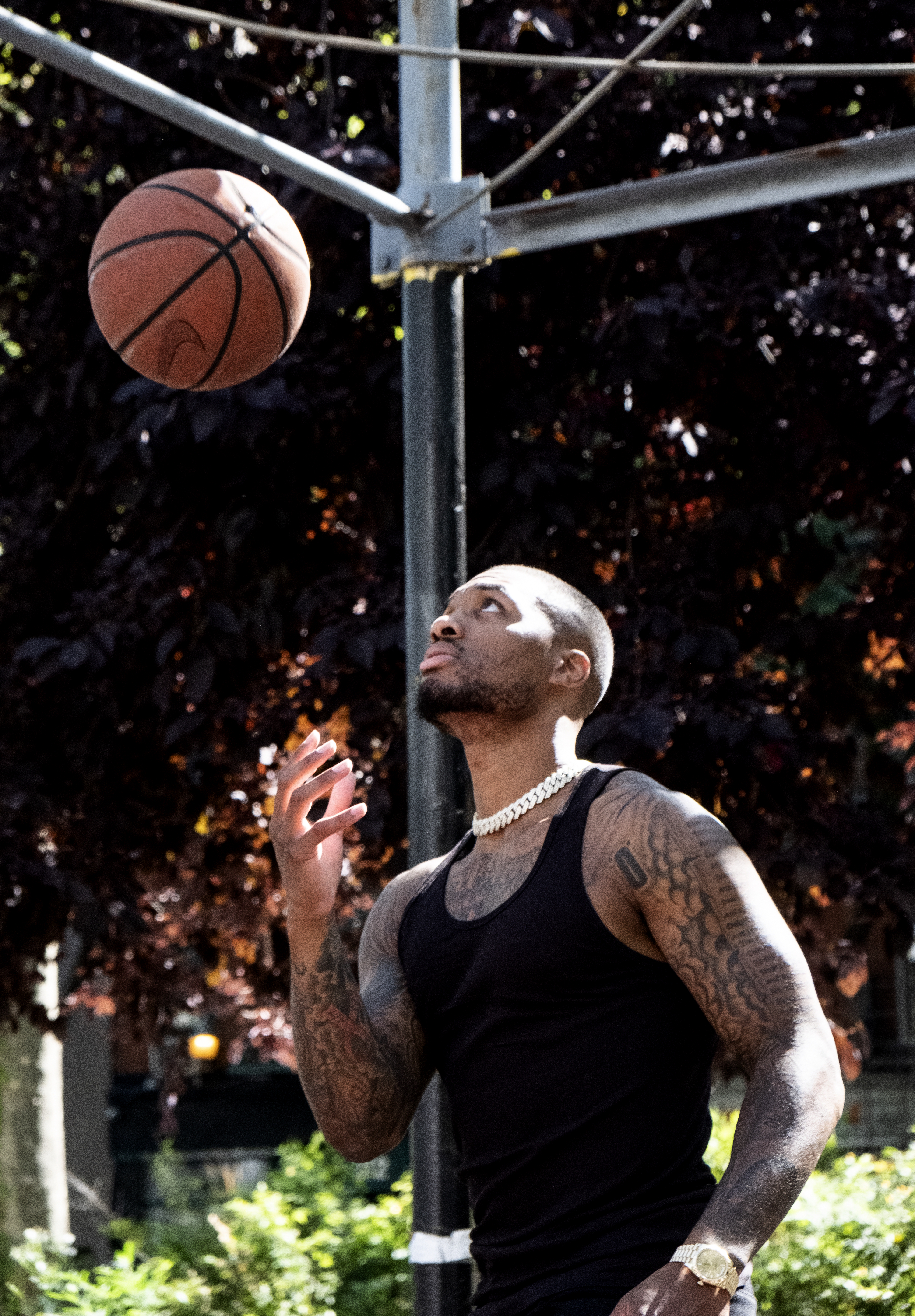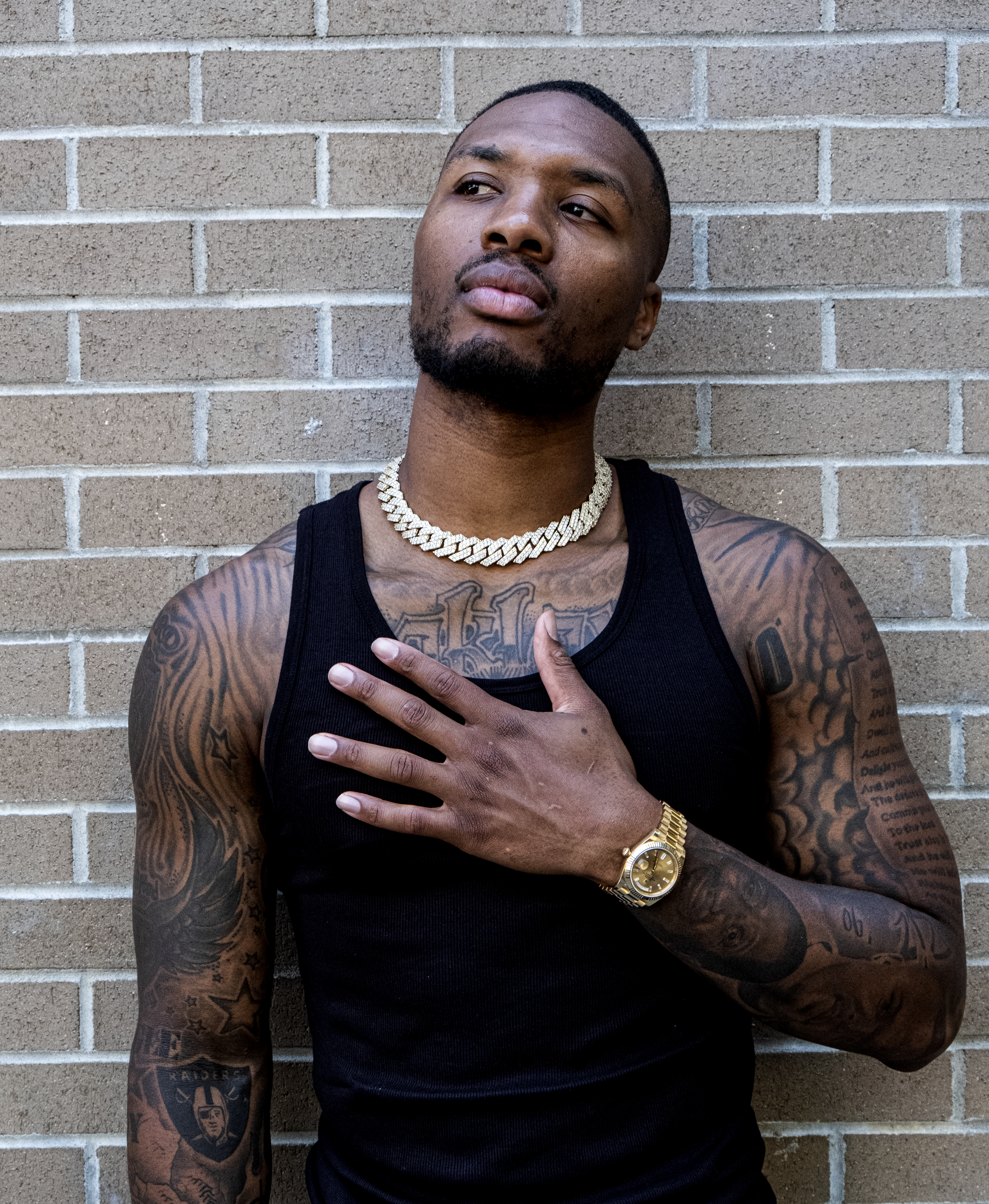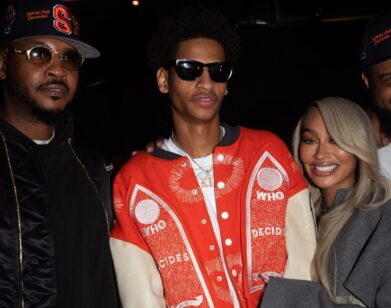Damian Lillard, The Rapper Who Happens To Be An NBA Superstar

Necklace (worn throughout) by GLD.
There’s only one real barometer for identifying when a basketball player has reached the top of the NBA mountain. It isn’t championships, or all-star games, or gaudy stats. It’s not shoe deals, or movie roles, or Instagram followers. It’s much simpler than that. It’s the name. LeBron. Steph. Russ. Giannis. Kawhi. The greats only need one. And after this year’s playoffs, when a 29-year-old point guard named Damian Lillard set an entire franchise ablaze with what has since become known as ‘The Shot,’ a new name was etched into the NBA pantheon: Dame.
And now that he’s achieved single-name status in the NBA, Lillard has his sights set on replicating that feat in the rap game. With the release of Big D.O.L.L.A., his third album under the moniker Dame D.O.L.L.A., Lillard is poised to do just that. We recently sat down with him to discuss why he might be the best rapper in NBA history, staying grounded in the spotlight, and how he (doesn’t) spend his money.
———
DAN BARNA: Congrats on your new supermax deal. Obviously you’ve been making money as an NBA player for a while, but did you make any flashy purchases of after you signed that deal?
DAMIAN LILLARD: I didn’t.
BARNA: You’ve had a pretty grounded relationship with fame and money ever since you entered the league. Where do you think that comes from?
LILLARD: I think it comes from my upbringing and the kind of family that I come from. There’s certain things that I take interest in that I’ll get myself. I like cars, but I don’t have ten of them. I have four of them. I like big houses and have nice stuff in my house, so I got a nice house. But I don’t have a bunch of nice houses. I got one nice house. I like to go on the water, so I have some jet skis. It’s just simple stuff like that. But I’m not like, “Okay, I just signed the supermax deal, let’s just go buy a bunch of shit.”
BARNA: Have you seen firsthand the corrupting power that large amounts of money and fame can have on an athlete?
LILLARD: Oh, for sure. It can cause problems. I think when you’re offered that kind of money, you start to feel like you can buy anything—you can buy your way out of anything. And a lot of times you have people around you that won’t go against it because they also benefit from what you do, and get to be a part of the events that you’re part of. They get to go on the vacations you go on. I think it can corrupt people in that way, where you start to feel untouchable, and like you don’t have to follow rules, like you’re playing a different game than everybody else. It can be like that, especially when your friends and your family fall in line because they don’t want to get pushed out and they want the benefits of being around you or being on your good side. I’ve been fortunate enough to not have to deal with that, or become that person because of the kind of family that I have and the kind of people that are around me.
BARNA: So keeping your parents close has helped you stay grounded?
LILLARD: My mom and dad don’t give a damn how much money I make, and it’s the same thing with my brother and my older cousins. I’ve been fortunate to not be a child star in a big-time college. I didn’t have to deal with my family waiting for me to make it and everybody trying to get in close to me, because nobody knew until it happened.
BARNA: How has your mentality in the league changed since your rookie season?
LILLARD: At the beginning of my career, it was the same as everybody. You’re finding your way, you’re figuring things out, trying to see how you stack up against your draft class. And then that second year, you’re thrown in the pool with everybody else, and there’s a new draft class. So I was on to the next thing, like, “Okay, how am I going to become an all-star? How do I help this team win the championship?” It eventually evolved to knowing my routine with basketball, my training, knowing who my trainers are, who’s going to travel with me. If I go to China, who’s coming with me. Everything back then was damn near freestyle. Everything I do now is planned out. And now I’m at the point where I’m able to get into certain rooms with people who can provide opportunities for me to get in on a business, and I can bring my family in, and now I’m employing people and the money’s not coming from my pocket. That’s kind of where the shift is, just that constant growth of how you can move, push yourself to a different level, and then you start elevating everybody else.

BARNA: Back in the day, guys like Kobe Bryant and Michael Jordan didn’t have the pursuits outside of basketball the way a lot of players do now. Do you think that’s a healthier approach to basketball, and life in general?
LILLARD: Yeah, I think it’s healthier. Being a professional athlete today gives you such a great platform; you can look around at the NBA alone and the 15th man on the roster who might play zero minutes a game, average one point, they still have a social media account, and they still have a following, and they still have certain things going on outside of the game of basketball. They may not be a max player or have a long career, so it’s important to them to be able to open up other doors. Our careers end earlier than maybe any other profession. The more you can feed your mind and body and have other things to take your interest away from the game, it’s always positive.
BARNA: Players are also under a way bigger microscope than they were even as early as ten years ago. Is it easy to block out all the noise?
LILLARD: Sometimes the game is stressful and sometimes the game is hard on your heart. You’ve got people talking about you on TV every day, on the internet every day, and they have more access to you every day. So it’s important to have other things to dive into, not only for post-career reasons, but for reasons to balance yourself out when you need to step away from it so it doesn’t get old or you don’t get tired of the court. You have to stay fresh about it.
BARNA: You’ve been called one of the best rappers, if not the best rapper in NBA history. Do you think you can get to a point where where we can take out the “in NBA history part?”
LILLARD: I think it’s possible because of the way I came in, being a professional athlete and actually building it up instead of jumping in and saying, “I’m a professional athlete, listen to my music.” I built it up like any other aspiring artist, and I’m constantly coming with music, with albums, and mixtapes and features. I think over time, even if I’m not considered the best, people will remember that Dame was a real rapper and he was in the NBA at the same time.
BARNA: NBA rappers have a history of being corny. Do you feel like you’re adding some credibility to the history of NBA rapping?
LILLARD: Oh yeah. For sure.
BARNA: Do you want to name some player-rappers who you thought were corny in the past and gave you guys a bad name?
LILLARD: Nope. No comment. Y’all don’t need me to name the names.
BARNA: Do you notice when a big celebrity is sitting court side?
LILLARD: I usually don’t notice.

BARNA: Even if it’s someone like Jay-Z?
LILLARD: I’m sure somebody would tell me. We’ve had people at our games like Denzel Washington. I noticed Spike Lee right away. It’s hard to explain because you don’t play in the NBA, but once you start doing all the pre-game stuff, and you focus on the game and you go into the scouting report, you’re getting ready to play. I run on the court thinking about the game and then, as you get closer to the game, you kind of just loosen up a little bit, like, “All right, we here.” And that’s when you might notice somebody. But if I noticed somebody before that, it’s because somebody mentioned it to me.
BARNA: Can you describe, in a couple of words, so that other human beings might understand, the feeling you had when you made that buzzer beater in the playoffs? It looks like the greatest kind of euphoria a human being could ever feel.
LILLARD: Everybody experienced high school. It’s kind of comparable to when you graduate high school and you walk onto the stage. It’s a bunch of people up there graduating. It’s an entire class. So for me, it’s a bunch of players out there making shots and doing stuff. But that was my moment within all of that. So when you walk across the stage, it’s like, everybody cheered for you, like you’re the special one in that class.
BARNA: Do you take secret pride in single handedly ending that era for the Oklahoma City Thunder?
LILLARD: Not really, because I’ve never thought of it that way. I didn’t know that they were going to be getting broken up.
BARNA: No, but in the months since, they kind of broke that team up and I think, if OKC had beat you in that series they might still be playing together. They might still have that core group of guys.
LILLARD: That’s true. Yeah. You never know.






